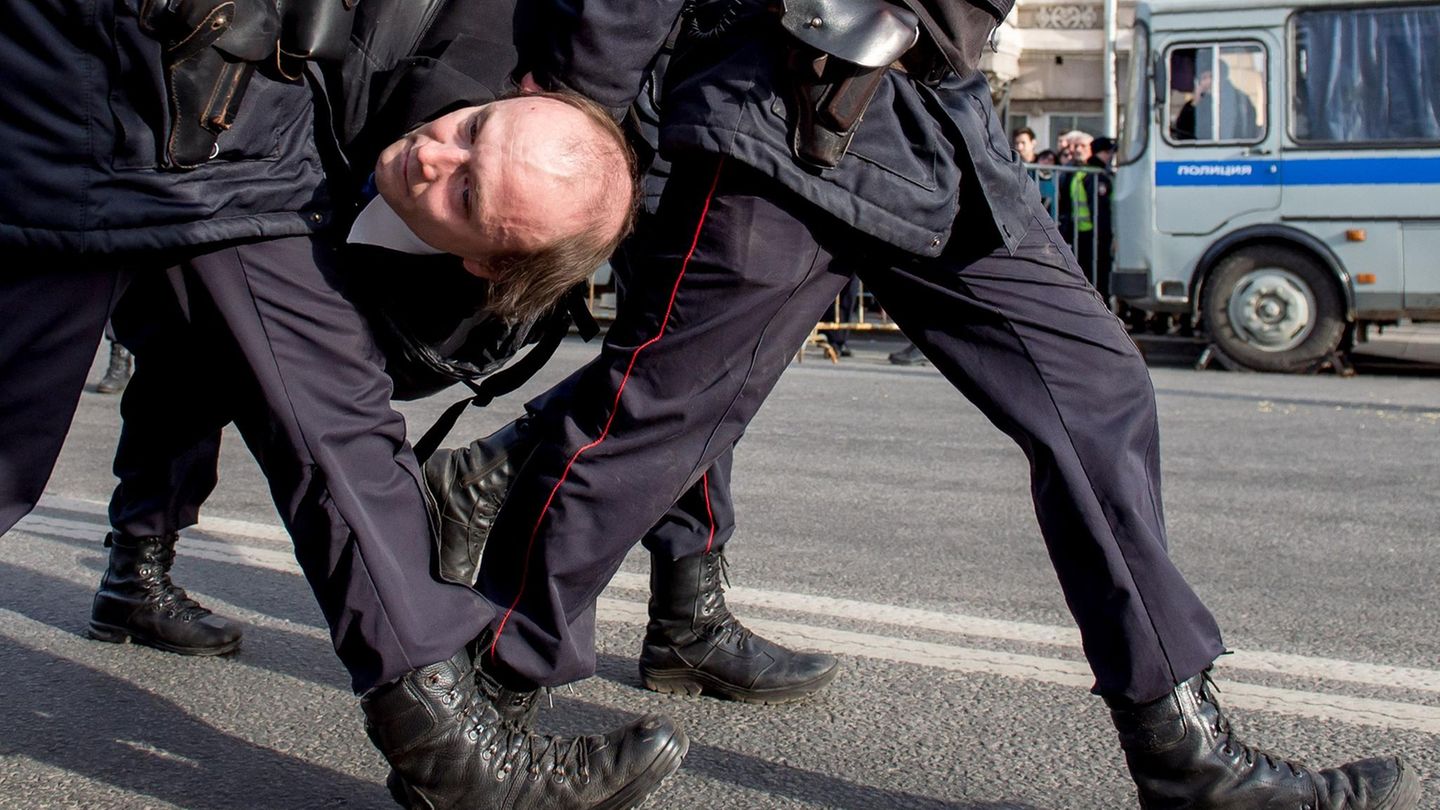A priest, a TV journalist, a university rector and an opposition figure: the Russian incarceration machinery is running at full speed. Even those who do not criticize the Ukraine war can no longer feel safe from the regime.
As of July 18, 2022, Father Johannes is the first Russian clergyman to be arrested for criticizing the Ukraine war. “I am a political prisoner who has to suffer for his faith. I consider the charges against me to be false and my imprisonment to be unlawful,” the priest from St. Petersburg’s Kresty prison said through his lawyer. It is not the first time that Father Johannes has clashed with the police over his stance on the war. Last, however, was the Ukrainian police.
“You kill civilians, you will end up in hell”
According to the BBC, which reports Father John’s arrest, his mobile phone, a laptop, two icons, his cassock and a wooden cross were taken from him. The reason for his imprisonment is probably an eight-and-a-half-minute YouTube video from mid-March in which he says that those who unleashed violence do not go to heaven and that it was the Russians who started the war. In the clip he compares the invasion of the Kremlin with the jihad of militant Islamists. “You kill civilians, you will end up in hell,” said the priest.
Five years ago, in turn, it was Ukraine’s domestic secret service that took on Father Johannes. At that time, the cleric lived in central Ukraine’s Vinnytsia and publicly used the “St. George’s Ribbon”. The orange and black symbol represents victory over Nazi Germany in Russia and a pro-Russian expression of solidarity in Europe. Ukraine had therefore banned its use and summoned Father Johannes. His brother Alexander told the BBC: “He was not pro-Russian but, as a radical advocate of freedom of expression, thought it wrong to ban the use of the ‘St George’s Band’.” At that time, Johannes had to pay a fine of the equivalent of 100 euros today.
The Russian TV journalist Marina Ovsjannikova should not get off that easily. Because the reporter, who became known through a simple and spectacular protest action on Russian television, was temporarily arrested after renewed criticism of the war of aggression, as she wrote on Telegram. After that, she was just walking her dog when uniformed officers approached her and took her away. After three hours, however, she was apparently allowed to walk again.
The reason for her arrest was a solo demonstration near the Kremlin on July 15. She held up a placard calling Russian President Vladimir Putin a murderer and his soldiers fascists. In Russia, this is considered publication of “false information” and “denigration” of the army and is punishable by law. There are long prison sentences. Owzyannikova became known because she held up a sign reading “No War” behind the anchorwoman during a news broadcast in mid-March.
Ilya Yashin is in prison in Russia
BecauseIlya Yashin, 39, one of the last known opposition politicians living in freedom, is now also in custody for “spreading false information”. He is also under investigation for “spreading false information about the Russian military.” According to his lawyer, Yashin is accused of describing “the murder of civilians in Bucha” as a “massacre” on YouTube. Russian units are said to have committed war crimes in the Kiev suburb, and the Kremlin in turn accuses Ukraine of orchestrating the crimes. A Moscow court has ruled that Yashin must remain in prison until September 12.
Yashin was initially sentenced to 15 days in prison on June 28 for “disobedience to the police”. Before the new allegations became known, he had reported in online services that he should be released on Wednesday. “Maybe they’ll let me out, maybe they won’t,” he wrote. After the detention was extended, Yashin shouted in the courtroom: “Don’t be afraid of these scoundrels! Russia will be free!” He described the allegations as politically motivated. His case will continue to be negotiated behind closed doors so that “no state secrets are revealed,” as the opposition member said.
Exiled Russian political scientist Fyodor Krasheninnikov believes that Russia’s security agencies have some sort of arrest quota to meet. FSB agents would indiscriminately detain people to prove they were successful in fighting Russia’s enemies. “Today’s Russia has a system comparable to that of Stalin’s times. Every regional branch of the FSB is required to present successes in the fight against spies,” the “Bild” newspaper quoted the publicist as saying.
During the so-called Stalinist purges from the 1920s to the end of the 1930s, both real and alleged enemies of the state were arrested, tortured or even killed. The exact number of victims is unknown, estimates range from three to 20 million. The country is still a long way from such nightmare conditions, but Krasheninnikov says: The FSB employees “have to search compulsively for possible spies, otherwise their department will be faced with unpleasant questions. If they unmask the alleged traitors, they will be rewarded Promotion and a higher salary.”
Terminally ill scientist in sight
The political scientist mentions the case of the quantum optician Dmitry Kolker as an example. The 54-year-old, who was suffering from pancreatic cancer, died in prison in early July after being targeted by the security apparatus. His “crime”: He hadn’t criticized the Ukraine war or the policies of the Russian leadership, but had given a lecture to Chinese students. He was then charged with leaking secrets. According to his son, the content of the lecture had previously been discussed with the secret service and FSB agents were present.
The Russian exiled journalist Mikhail Zygar recently wrote in “Spiegel” about the strange-looking case of Vladimir Mau, who was confirmed as CEO of the energy giant Gazprom at the end of June, even though the authorities were investigating him. The rector of a civil service college was arrested on the day of his re-election and then placed under house arrest. Mau was probably too western for the rulers, or rather not enough Russian. “The regime launched an all-out attack on that part of the intelligentsia that remained in the country. It is no coincidence that this time it hit those who tried to appear loyal and not publicly condemn the war in Ukraine,” writes Zygar.
Even abroad, Russia is now trying to take legal action against critics of Putin. The embassy in Switzerland complained about an in which the Russian president was illustrated with a clown’s nose and described as a “war criminal”. “We are forced to note that your newspaper publishes articles by a variety of authors who harshly and with impunity spread their inventions and insults against the Russian government,” read a letter to the newspaper’s editor-in-chief. The letter ends with a threat: “We reserve the right to report this and possible future slanderous and insulting publications regarding the Russian government in your newspaper to the Swiss criminal authorities.”
Sources: DPA, AFP, Reuters, , “”, “”, “”, “Neue Zürcher Zeitung”, “”, BBC
Source: Stern
David William is a talented author who has made a name for himself in the world of writing. He is a professional author who writes on a wide range of topics, from general interest to opinion news. David is currently working as a writer at 24 hours worlds where he brings his unique perspective and in-depth research to his articles, making them both informative and engaging.




